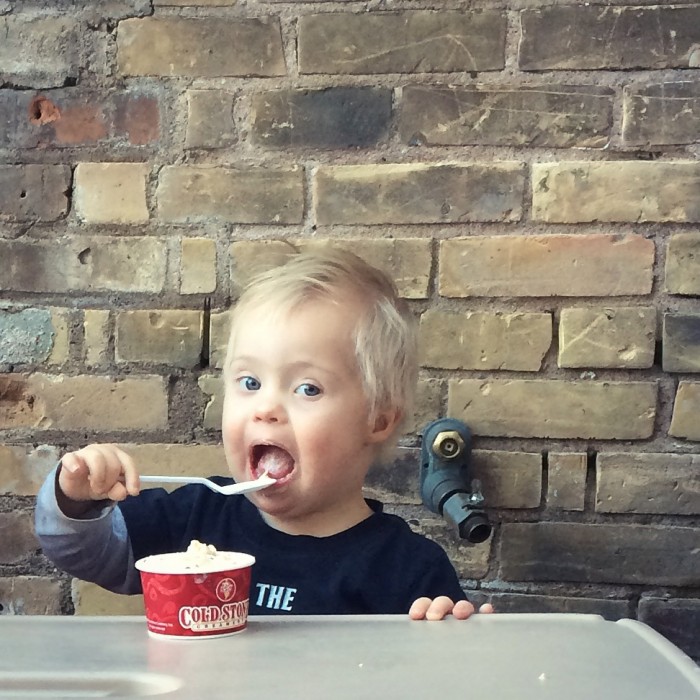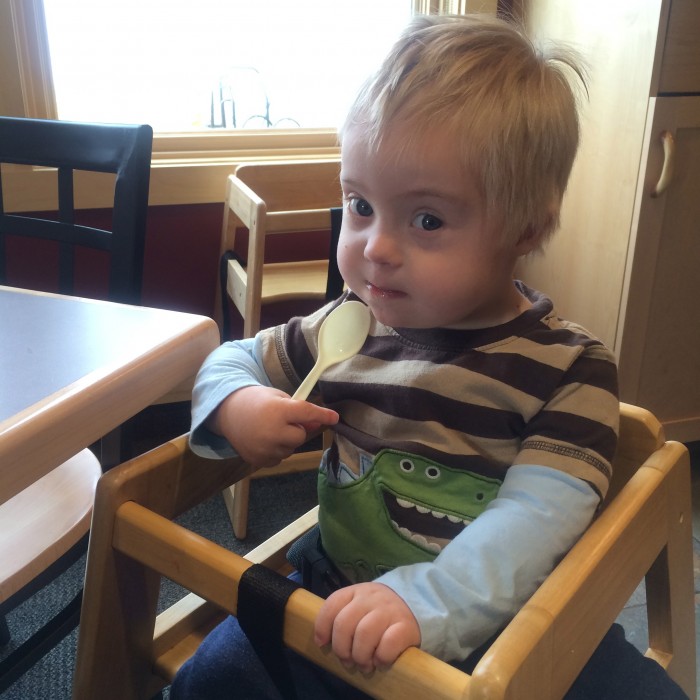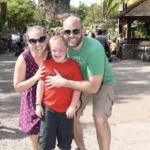Sam was not the first person in my life with Down syndrome. Before our little man arrived, I worked with a young woman with Down syndrome at a local high school. I will never forget the first day I walked into the classroom. Her face brightened as she exclaimed, “I’m so happy to see you again!” I had never met her before, but her genuine happiness in seeing me absolutely made my day. She asked me to sit and help her with her work, which that day was adding up dimes and quarters on a worksheet. I worked with her for one semester. This was after we had moved back to Duluth and Ella was a year old. I decided to take an online class through the university to expand my knowledge of teaching special education classes since it was something I felt I had lacked while teaching before Ella was born. During that semester, I needed to write a paper on a specific area of special needs. I chose Down syndrome. It wasn’t until Sam was about 6 months old that I remembered the assignment. Amazing how a thing in our past can become something much more than we ever could have imagined.

While working with this beautiful, energetic young woman, I was quite aware that I didn’t know the appropriate way to talk about her diagnosis. We may have gone over suitable titles for special needs and disabilities at some point in my class, but I just couldn’t remember. It felt like the politically correct terms were always changing, anyway, and I was afraid of offending someone by using the wrong terminology. (Even while writing this, I know I’m using terms that will likely be on the ‘do not use’ list soon!)
Even after the last two years, I still get a little nervous about saying the wrong thing, but there is one basic concept that has helped tremendously. People First Language is the idea that, no matter the circumstances or diagnosis, a person is a person first. The other stuff comes later. Thinking of it that way makes it easier to remember the appropriate way to talk about a person with a disability. For example, if we’re talking about Sam, it would be appropriate to say, “The boy who has Down syndrome” rather than “The Down syndrome boy.” That would be opposed to something I’ve heard a lot, “a Down’s baby.” For example, “My neighbor has a Down’s baby.” It’s quite different to say, “My neighbor has a baby who has Down syndrome.” The reason is that we’re focusing on the baby, not the diagnosis.
As the mama of an incredible little boy who does happen to have a unique diagnosis, I want people to focus first on who he is as a person. After all, he is far more like other toddlers than he is different. And I know that when people spend time with Sam, they don’t walk away thinking about his diagnosis. They remember Sam, a bright, blue-eyed boy.
People First Language is the same with practically any diagnosis. For example:
My sister works with boys who have Autism. // Not: My sister works with Autistic boys.
Matthew has an intellectual disability. // Not: Matthew is mentally disabled.
I was surprised with how many medical professionals did not address Sam using People First Language when he was born, which was perhaps the first time I recognized that there must be some other way to address these terms. I remember hearing “He’s a Down’s baby” or similar variations. I know they didn’t mean it in a bad way, but I can tell you that the words hurt my heart. I want people to see Sam for being Sam. He is smart and full of joy and has a fantastic sense of humor.

One other thing that is somewhat on this same topic. Until Sam was born, I thought it was okay to shorten Down syndrome to Downs. I quickly realized, however, that very, very few people within the Down syndrome community use only the word Downs. For me it feels far more respectful to use the entire term.
The main thing to keep in mind is that, even if you don’t happen to use the perfect terminology, it really comes down to your intent. Did you use a phrase that may not be overly accepted while talking to the mom of a child with Down syndrome at the playground? It’s okay! It’s kind of like being in a different country and trying to speak the language because it feels polite. I would much rather have someone ask me about Sam than shy away because they don’t know the proper terms.
If you do have any questions about People First Language or about Down syndrome, feel free to post them in the comment section or on Facebook. I’ll do my best to answer each one!





Believing that all humans are created in the image of God, I think such “people first” language is not only appropriate but also biblical. And not only in referencing those with a diagnosis or disability…I am thinking of many ways we refer to others who are in any way different from ourselves. Thanks for a good reminder of how much our words matter!
I am looking forward to the day I can meet Sam in person!
I couldn’t agree more! And I am so excited to introducing the two of you!!
Thank you for teaching us! I know so little about Down syndrome or any special needs for that matter. Sammy is the first person I’ve met personally who has Down syndrome, and I appreciate how open you are to talking about his diagnosis because it puts me (and I’m sure others) at ease around him and you. I like your analogy about speaking another language and the grace given just for attempting to speak it. Love your passion for your son and for special needs and for teaching!
Jen, it’s really encouraging to hear that you’re learning from what I share. I sometimes forget how little I knew before Sam was born. He is teaching me so much!
What a lovely blog! I found you on one of the Google+ communities and so glad I did 🙂
I have worked with women, who happen to have various disabilities, for years and I can tell you firsthand how rewarding it has been! Challenging at times…but VERY VERY rewarding!!
I am going to be now following your blog & look forward to seeing your family’s journey unfold.
Here is mine (if you want to drop by; also I have a weekly link up & I’d invite you to share any of your posts there) http://www.parentingandhomeschoolinginfaith.com
Rachael 🙂